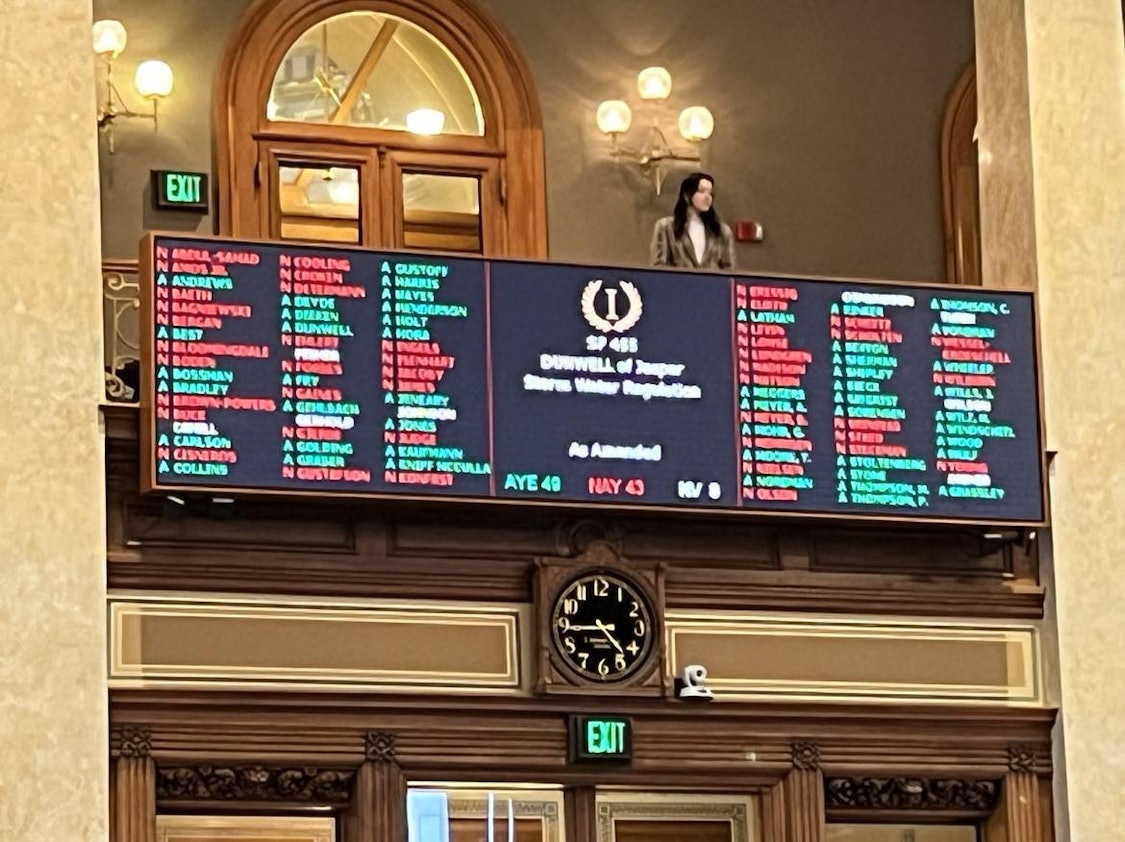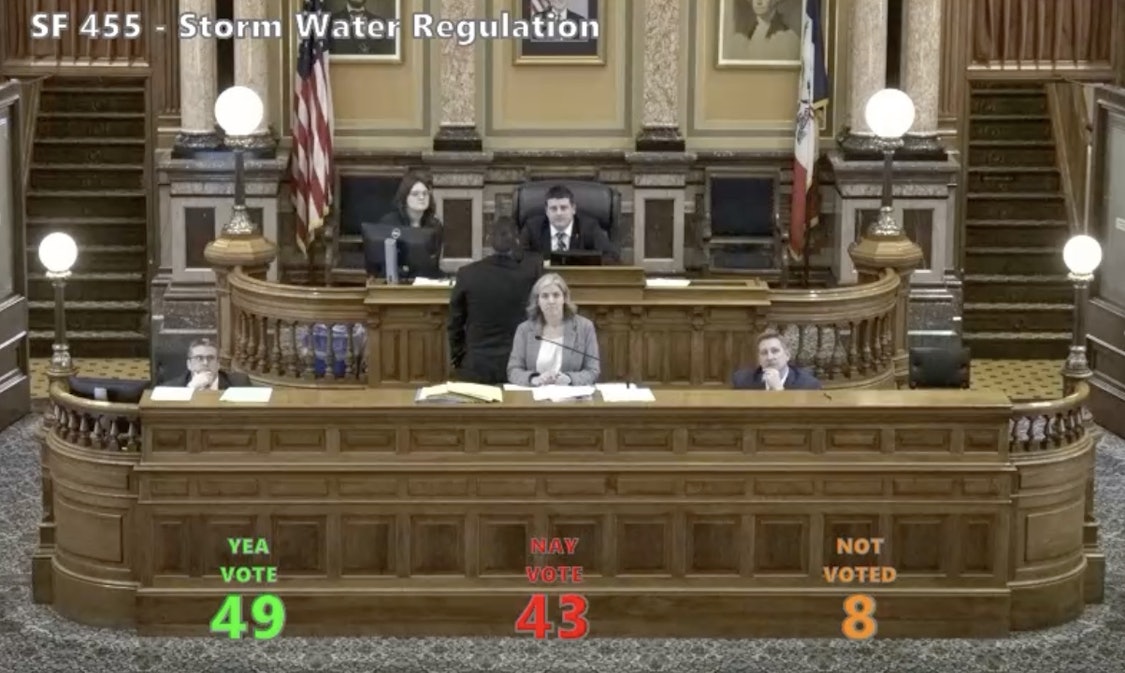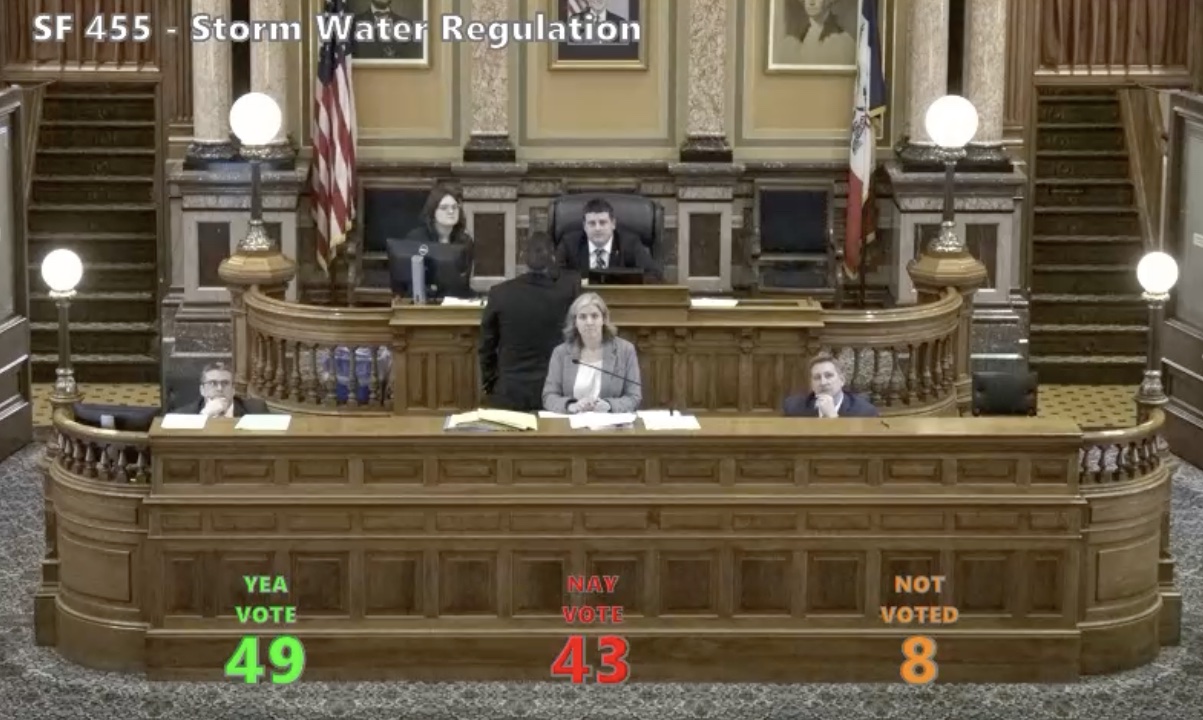For the second time in three years, a bill backed by top Iowa House Republicans failed to gain the 51 votes needed on the House floor. Senate File 455, which would restrict local government authority to regulate topsoil and stormwater, topped out at 49 votes in favor during floor debate on March 6. By the time the clerk closed the machine a few minutes later, yes votes had dropped to 44.
Such events are rare in any legislature, because leaders typically don’t bring a bill to the floor unless they know it will pass. No bill favored by the majority has failed an Iowa Senate floor vote for many years.
The last time Iowa House GOP leaders lost a floor vote was in March 2022, on an amendment that combined liability protection for trucking companies with limits on private employers requiring employees or customers to be vaccinated against COVID-19. Republicans had a 60-40 majority at that time; the GOP advantage in the chamber has since grown to 64-36.
Majority Leader Matt Windschitl quickly filed a motion to reconsider Senate File 455, indicating leaders plan to call another vote on the bill soon. Even so, the episode revealed surprisingly deep opposition to this legislation in Republican ranks.
BILL STALLED IN THE HOUSE LAST YEAR
It was no secret that Senate File 455 had a hill to climb in the state House.
Republican State Senator Scott Webster, a home builder in the Quad Cities area and former president of the Iowa Homebuilders Association, introduced the legislation in his very first week as a member of the Iowa Senate in 2023. The upper chamber approved the bill on a party-line vote last March, and it advanced from the House Local Government Committee in time for the legislature’s second “funnel” deadline.
But House leaders never brought the bill to the floor during the 2023 session, indicating a lack of firm support in the GOP caucus.
Ten influential business or conservative advocacy groups have lobbied in favor of Senate File 455, claiming it would keep housing construction costs down. More than two dozen groups representing local governments, professional associations of engineers, architects, and water managers, and environmental organizations oppose the bill, on the grounds that it would hamper flood prevention and mitigation efforts, and shift costs to the public.
You can find the full list of lobbying declarations at the end of this post. (Disclosure: Laura Belin serves on the board of directors for the nonprofit 1000 Friends of Iowa, which has advocated for stronger local stormwater and topsoil ordinances and is a member of the Iowa Environmental Council.)
A future Bleeding Heartland post will explore the arguments for and against Senate File 455 in more detail. This white paper by engineer Gregory Pierce explains the basics about stormwater runoff from residential developments.
LATE AMENDMENT FAILS TO WIN OVER ENOUGH REPUBLICANS
The floor manager, State Representative Jon Dunwell, offered a strike-after amendment during the March 6 debate. He said the new language would redefine “construction site” and “topsoil” to be consistent with Iowa Department of Natural Resources permitting practices.
He argued the amended bill would balance interests, to “make sure housing is affordable,” while requiring developers to take some actions to limit stormwater runoff and put topsoil back on new residential lots. He added that cities and counties would have more flexibility, while also sharing costs between the local government and the developer. Several Democrats spoke against the amendment, which the chamber adopted by voice vote, and against the bill.
Things got strange after Dunwell moved final passage of Senate File 455. The yes votes stalled in the 40s, finally creeping up to 49—two short of a majority. A view of the electronic board in the Iowa House shows there was little prospect of getting over the top, with Democrats united against the bill and four Republicans absent (Dean Fisher, Thomas Gerhold, Craig Johnson, and Anne Osmundson).

At that point, Windschitl approached “the well” to confer with House Speaker Pat Grassley for a couple of minutes. View from the official video:

As Windschitl walked away, the yes votes began to dwindle. Four Republicans switched to no: Eddie Andrews, Brian Best, Shannon Latham, and Matthew Rinker. Windschitl also switched to no just before the vote closed, in order to preserve his ability to file a motion to reconsider later.
When all 64 House Republicans are present, leadership can afford to lose no more than thirteen. When four are absent, as was the case on March 6, the GOP can lose no more than nine. The final roll call on Senate File 455 shows sixteen Republicans voting no—fifteen if you don’t count Windschitl, who switched for tactical reasons. Eight have some previous local government experience.
- Eddie Andrews
- Michael Bergan (former Winneshiek County supervisor)
- Brian Best (serves on the Glidden Planning and Zoning Board)
- Jane Bloomingdale (former mayor of Northwood)
- Brooke Boden
- Mark Cisneros
- Tom Determann (former Clinton city council member and Clinton County supervisor)
- Stan Gustafson (former member of the Los Osos Community Sewer District board in California)
- Chad Ingels (former Iowa State University Extension watershed specialist, former member of the state Environmental Protection Commission, former West Central Community School Board member)
- Shannon Latham
- Brian Lohse (former Bondurant city council member)
- Shannon Lundgren
- Norlin Mommsen
- Matthew Rinker (former Burlington city council member)
- Matt Windschitl (supports the bill)
- David Young
HOW DID THIS HAPPEN?
House leaders haven’t commented publicly on what went wrong with the March 6 vote. At least three explanations are plausible.
1. Windschitl and Grassley miscalculated in some way. For instance, they might have misunderstood some members’ position on the bill, or forgotten that some colleagues needed to reach 51 votes were absent.
2. Two or more GOP caucus members might have misled leadership about their support for Senate File 455 ahead of the debate.
3. Two or more members might have changed their minds between the last closed-door discussion of the bill and the floor vote. It’s worth noting that March 6 was the Iowa League of Cities’ “Local Leaders Day.” The lobby group brought many representatives of municipal governments to the state capitol to meet with legislators in the early afternoon, several hours before the House debate. Perhaps some of those officials were able to persuade lawmakers that Dunwell’s amendment (published on March 5) didn’t do enough to improve the bill.
I wouldn’t bet against House leaders getting Senate File 455 passed on the second attempt. As mentioned above, Andrews, Best, Latham, and Rinker were willing to vote yes on March 6, before it was clear the bill would fail.
Assuming they all support the bill again, leaders would need only two votes from the four Republicans who were absent on March 6 (Fisher, Gerhold, Johnson, and Osmundson).
On the other hand, some House members who were reluctant “yes” votes on March 6 could be emboldened to oppose the bill after seeing how many of their colleagues have misgivings about tying local governments’ hands on topsoil and stormwater policies.
Final note: In Congress and some state legislatures, 49 votes would be enough to pass a bill when 92 members participated in the vote. However, Iowa’s constitution requires that bills, resolutions, or motions receive a majority of all members of each chamber (51 votes in the House, 26 in the Senate) in order to be adopted.
UPDATE: Windschitl brought this bill to the floor again on March 11, and House members approved it by 53 votes to 46. All Democrats present voted no, joined by ten Republicans (Bergan, Best, Boden, Cisneros, Zach Dieken, Ingels, Megan Jones, Lohse, Lundgren, and Mommsen).
The four Republicans who were absent last week were present on March 11, and all supported the bill.
Eight Republicans (Andrews, Bloomingdale, Determann, Gustafson, Latham, Rinker, Windschitl, and Young) flipped from no in last week’s vote to yes on March 11. Two Republicans (Dieken and Jones) flipped from yes on March 6 to no on March 11.
Appendix: List of organizations registered on Senate File 455, as of March 6
Ten groups representing business interests are lobbying for the bill:
- Iowa Manufactured Housing Association
- Home Builders Association of Iowa
- Iowa Association of Business and Industry
- Master Builders of Iowa
- Americans for Prosperity
- Associated General Contractors of Iowa
- Iowa Bankers Association
- Iowa Association of Realtors
- Developers Council
- Iowa Real Estate Developers Association
Thirty-one entities representing local governments, engineering or water management professionals, and environmental organizations are lobbying against the bill:
- City of Waukee
- City of Des Moines
- County Planning and Zoning Officials of Iowa
- Iowa Environmental Council
- Sierra Club, Iowa chapter
- Iowa State Association of County Supervisors
- Iowa State Association of Counties
- Conservation Districts of Iowa
- Iowa Rivers Revival
- City of Cedar Rapids
- Iowa League of Cities
- American Council of Engineering Companies
- Linn County Board of Supervisors
- City of Cedar Falls
- City of Coralville
- American Planning Association, Iowa chapter
- American Society of Landscape Architects, Iowa chapter
- Urban County Coalition
- Marion County Board of Supervisors
- Iowa Association of Building Officials
- Environmental Law and Policy Center
- Izaak Walton League, Iowa division
- Iowa Engineering Society
- American Council of Engineering Companies
- American Institute of Architects, Iowa chapter
- Iowa Interfaith Power & Light
- Iowa Stormwater Education Partnership
- American Society of Civil Engineers, Iowa section
- City of West Des Moines
- Iowa Association of Water Agencies
- American Water Works Association, Iowa section


4 Comments
as if we don't have more then enough poorly built sprawl houses
popping up every day, starting to wonder how long we will even have city governments worth the name…
dirkiniowacity Thu 7 Mar 1:49 PM
The issue of housing...
…has proven to be useful for those who want to weaken already-weak environmental laws and ordinances. One example is the fast-tracked new Indiana law that severely weakens wetland protection. Developers pushed very hard for that.
Another new Indiana law will allow some developers to build on much steeper slopes, in spite of warnings that the increased erosion will pollute water. A conservation-professional friend in California told me that housing is the go-to argument for developers in that state who want local governments to allow further loss of shrinking green space. Other states have their own examples.
Climate change is huge and understandably gets most of the public attention paid to the environment. Unfortunately, other environmental problems are also growing.
PrairieFan Thu 7 Mar 5:19 PM
And to Realtors in Iowa...
I know that some individual Realtors support good causes and progressive organizations, with their names attached. But that does not change the reality that for the Iowa Association of Realtors to support this very bad bill is a very bad look.
PrairieFan Fri 8 Mar 11:50 AM
Now the bill has passed...
…and I am reminded again of the general environmental divide between the major political parties, per the NATURE research paper below. (This is an excerpt from the abstract).
***
Polarisation of Climate and Environmental Attitudes in the United States, 1973-2022
E. Keith Smith, M. Julia Bognar & Adam P. Mayer
Since the early 1990s, increasing political polarisation is among the greatest determinants of individual-level environmental and climate change attitudes in the United States…We harmonised four unique sets of historical, pooled cross-sectional survey data from the past 50 years to investigate shifts across seven distinct measures of citizen environmental and climate change attitudes. We find that contemporary attitudes are polarised symmetrically, with Democrats (higher) and Republicans (lower) attitudes are equidistant from the median.
PrairieFan Tue 12 Mar 11:45 PM